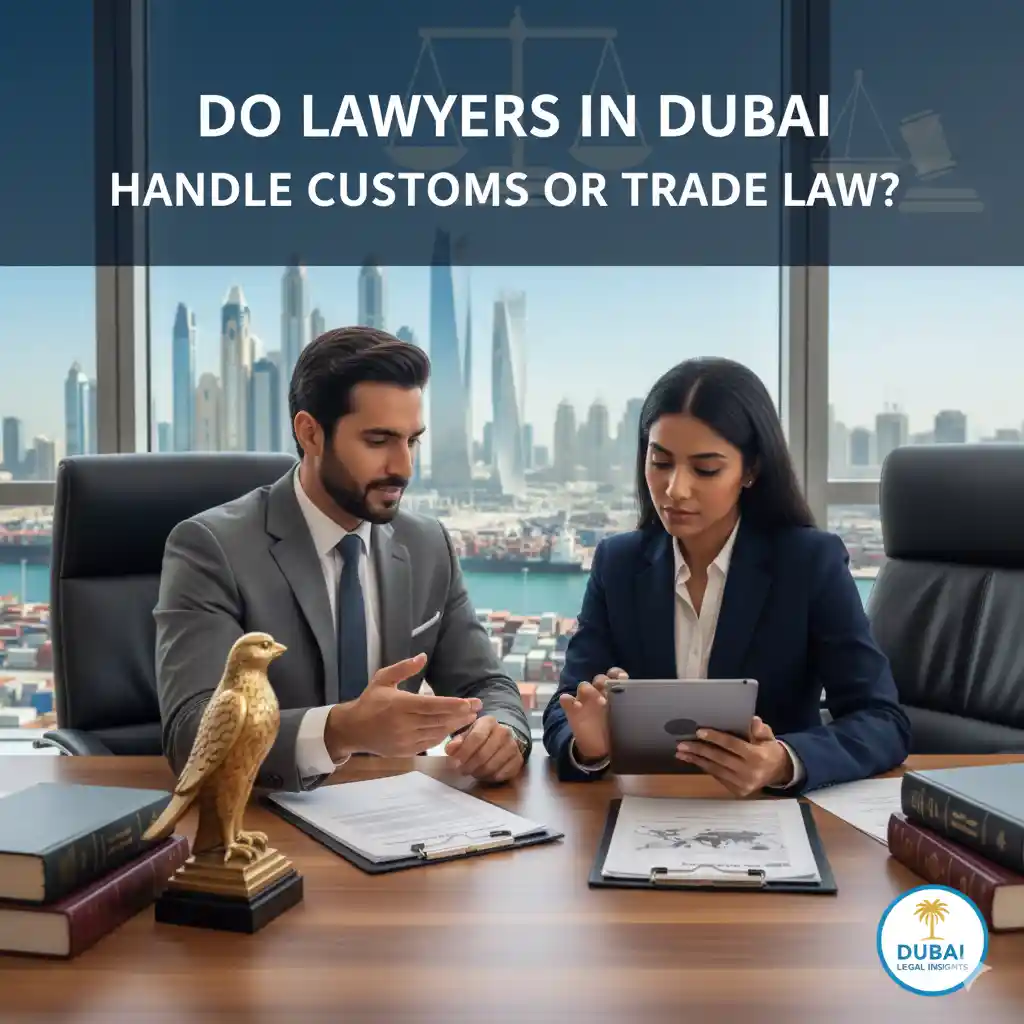A Complete Guide to Understanding Legal Support for International Trade in the UAE
As Dubai continues its ascent as a global trade hub, businesses of all sizes—importers, exporters, manufacturers, logistics companies, and investors—frequently ask a common question: Do lawyers in Dubai handle customs or trade law? The short answer is yes; many legal professionals in the emirate are not only qualified to handle customs and trade issues but are also highly specialized in these areas due to the city’s strategic position in global commerce. However, the full answer involves understanding what customs and trade law actually cover, how Dubai’s regulatory environment works, and what roles legal experts play in navigating these frameworks.
This article explores these aspects in depth, offering businesses, entrepreneurs, and professionals a comprehensive understanding of how customs and trade law functions in the UAE and the indispensable role of legal specialists in this field. Whether you’re entering the Dubai market for the first time or expanding your international footprint, this guide outlines why expert legal support is essential.
Understanding Customs and Trade Law in Dubai
Customs and trade law governs the movement of goods across borders, compliance with trade regulations, adherence to import and export standards, taxation, duties, and the documentation needed to ensure lawful and efficient cross-border transactions. In a city like Dubai—home to Jebel Ali Port, one of the largest ports in the world, and numerous free zones dedicated to trade—these laws take on greater importance.
Several key pillars make up customs and trade law in Dubai:
Federal and Local Regulations
The UAE operates under a federal system, meaning customs law is unified across all seven emirates under the Federal Customs Authority. However, Dubai Customs implements the law locally and regulates commercial activity within its jurisdiction.
Trade Agreements and International Obligations
The UAE is part of various international treaties and agreements, such as:
- World Trade Organization (WTO) guidelines
- Gulf Cooperation Council (GCC) Customs Union
- Bilateral and multilateral trade agreements
Understanding these obligations is crucial because they affect tariff structures, permissible goods, exemptions, and trade facilitation measures.
Free Zone Regulations
Dubai is home to more than 30 free zones, each with unique rules governing trade, customs exemptions, and import/export procedures. Examples include:
- JAFZA (Jebel Ali Free Zone)
- Dubai Multi Commodities Centre (DMCC)
- Dubai Airport Free Zone (DAFZA)
Companies operating in these zones often benefit from tax exemptions, duty-free importation, and streamlined customs processes—but only if they stay compliant.
Compliance and Enforcement
Regulations cover labeling requirements, certificates of origin, health and safety standards, intellectual property protection, sanctions compliance, and anti-money-laundering rules linked to trade.
Because of the complexity, businesses frequently require legal professionals to interpret and adhere to these rules as they conduct international trade.
Why Customs and Trade Law Is Important for Businesses
Dubai’s position as a global marketplace means companies must manage a combination of local, regional, and international trade requirements. Failing to comply can lead to:
- Significant penalties or fines
- Shipment delays
- Confiscation or destruction of goods
- Blacklisting or suspension of trade licenses
- Loss of trade privileges within free zones
Given these risks, legal guidance is not merely recommended—it is often essential.
So, Do Lawyers in Dubai Handle Customs or Trade Law?
Yes. Many legal practitioners in the UAE specialize specifically in customs and international trade law due to Dubai’s unique economic environment. These professionals help businesses interpret, navigate, and comply with complex trade regulations while safeguarding their commercial interests.
There are two types of relevant experts:
Customs Lawyers
These lawyers focus on regulatory compliance related to the import and export of goods. Their role includes advising on customs duties, documentation, tariff classification, valuation rules, exemptions, and dispute resolution with customs authorities.
Trade Lawyers
Trade lawyers handle international trade agreements, sanctions compliance, dispute settlement under WTO frameworks, and cross-border commercial transactions.
Both roles often overlap, especially in sectors like logistics, manufacturing, retail distribution, e-commerce, pharmaceuticals, and technology.
What Exactly Do These Lawyers Do?
Below are the most common services provided by legal experts who specialize in customs and trade law in Dubai.
Customs Compliance and Regulatory Advisory
Customs compliance is a major concern for businesses importing or exporting goods. Lawyers assist by:
- Classifying goods under the correct HS codes
- Advising on tariff and duty rates
- Ensuring accurate documentation
- Guiding companies on restricted or prohibited items
- Helping with exemptions, duty-free schemes, and incentives
Correct classification and documentation can save a company significant costs while preventing compliance issues.
Handling Disputes with Dubai Customs
Businesses may face disputes due to:
- Value reassessment
- Misclassification
- Seizure of goods
- Alleged violations of customs regulations
Trade-focused lawyers help negotiate, appeal, or litigate such matters, ensuring that businesses receive fair treatment under the law.
Import and Export Licensing
Many industries require special permits to bring goods into or out of the UAE. Lawyers help companies determine which licenses they need and assist in obtaining them from the relevant authorities.
Free Zone Advisory
Companies operating within free zones often require tailored advice on:
- Exemptions from customs duties
- Rules for moving goods to the mainland
- Re-export procedures
- Compliance with free zone authorities
Because each free zone has its own regulatory nuances, legal guidance ensures that companies do not inadvertently breach rules.
International Trade Agreements and Treaty Compliance
Trade lawyers interpret:
- Bilateral trade agreements
- GCC trade regulations
- WTO principles
- Trade restriction frameworks
Businesses engaged in large-scale international operations rely on lawyers to ensure alignment with treaty requirements.
Anti-Dumping and Anti-Subsidy Measures
Dubai, as part of the GCC, enforces anti-dumping rules to protect local industries. Lawyers represent companies under investigation or affected by such measures.
Sanctions Compliance and Export Controls
Given global political dynamics, businesses must ensure compliance with international sanctions regimes. Lawyers help corporations understand:
- UN sanctions
- U.S. OFAC sanctions
- EU restrictions
- UAE federal restrictions
This is especially critical for multinational businesses, financial institutions, and technology companies.
Structuring Cross-Border Transactions
Lawyers help draft and review contracts for trade deals, ensuring terms comply with local and international laws. They also advise on dispute resolution mechanisms such as arbitration.
Why Businesses in Dubai Need Legal Support for Trade and Customs Matters
Dubai’s regulatory environment is business-friendly, but not simplistic. The city’s role as a global trade center attracts companies from around the world, each interacting with intricate local and international regulations.
Here are key reasons why companies benefit from legal counsel:
Reducing Financial Risk
Incorrect paperwork or non-compliance can result in penalties, shipment delays, or losses. Legal experts help prevent costly errors.
Faster, Smoother Customs Clearance
Lawyers ensure that documentation and classification meet requirements, enabling businesses to clear goods efficiently.
Efficient Dispute Resolution
If disputes arise, having legal representation increases the likelihood of a favorable outcome.
Strategic Trade Planning
Legal professionals help businesses maximize incentives, free zone benefits, duty exemptions, and efficient supply chain planning.
Protecting Intellectual Property in Trade
Counterfeit goods remain a global issue. Lawyers help with trademark registration, enforcement, and protection during the import/export process.
How to Choose the Right Trade or Customs Lawyer in Dubai
Selecting the right expert involves evaluating their:
- Experience in customs disputes or international trade law
- Reputation among businesses and regulatory authorities
- Understanding of free zones and logistics operations
- Familiarity with international treaties and sanctions
- Ability to support multilingual and multicultural clients
- Responsiveness in urgent trade matters
Businesses engaged in frequent import/export operations benefit from long-term partnerships with legal firms that understand their industry.
Common Industries That Require Trade and Customs Legal Services
Many sectors in Dubai depend heavily on customs and trade law, including:
- Logistics and freight forwarding
- Automotive
- Electronics and technology
- Pharmaceuticals and health products
- Luxury goods and retail
- Oil and gas equipment
- Manufacturing
- E-commerce
As global trade accelerates, these industries increasingly turn to specialized legal counsel to remain compliant and competitive.
Final Thoughts
The ever-evolving landscape of international commerce makes customs and trade law an essential component of doing business in Dubai. Not only do Lawyers in Dubai handle customs and trade law issues, but many are among the most experienced in the region due to the city’s status as a global trading powerhouse. Their expertise helps businesses avoid compliance pitfalls, optimize trade operations, resolve disputes, and grow confidently in an environment marked by rapid development and international engagement.
As Dubai expands its influence in global markets, the demand for legal professionals skilled in customs and trade matters will continue to rise. Companies that invest in proper legal guidance place themselves in the strongest position to thrive, safeguard their operations, and leverage the advantages of one of the world’s most dynamic trading centers. By partnering with qualified Lawyers in Dubai, businesses can ensure that every import and export decision aligns with local regulations, international agreements, and best practices for long-term success.




